通悟语法系列3:形容词、副词和比较等级(讲练结合 47张PPT)
文档属性
| 名称 | 通悟语法系列3:形容词、副词和比较等级(讲练结合 47张PPT) | 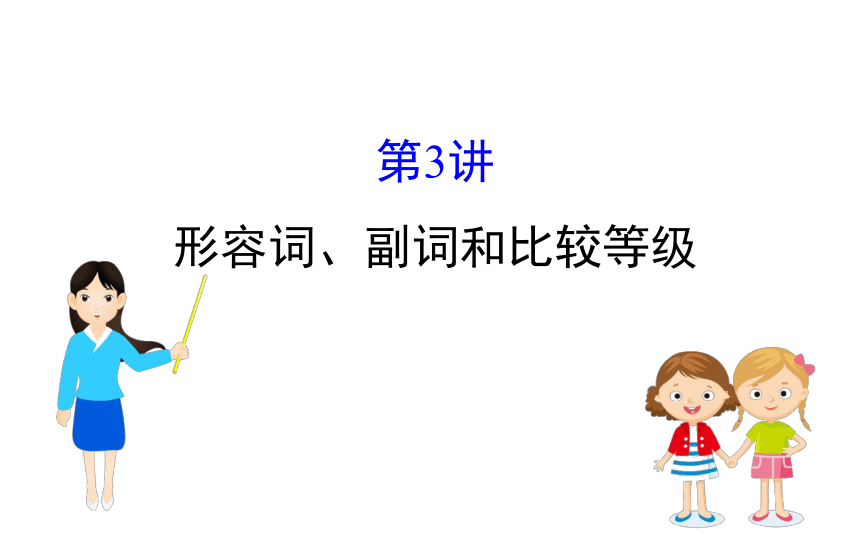 | |
| 格式 | pptx | ||
| 文件大小 | 3.8MB | ||
| 资源类型 | 教案 | ||
| 版本资源 | 通用版 | ||
| 科目 | 英语 | ||
| 更新时间 | 2020-08-10 08:27:17 | ||
图片预览

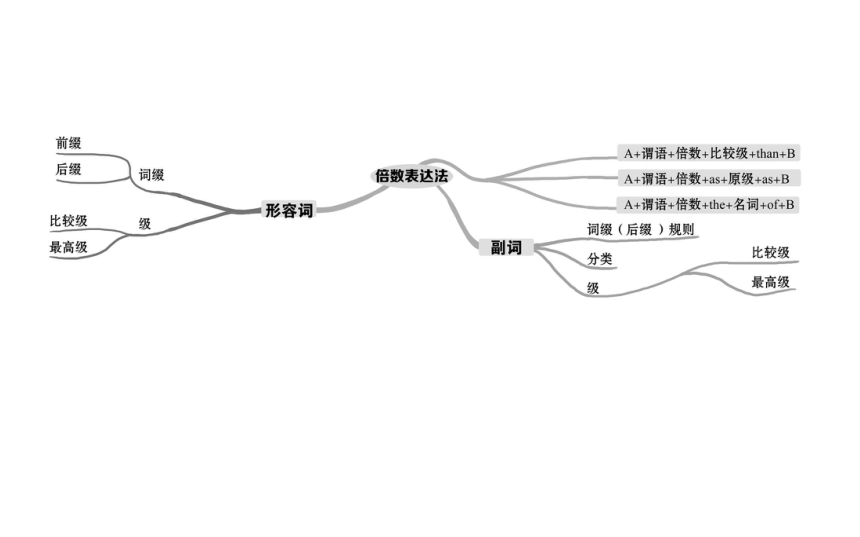
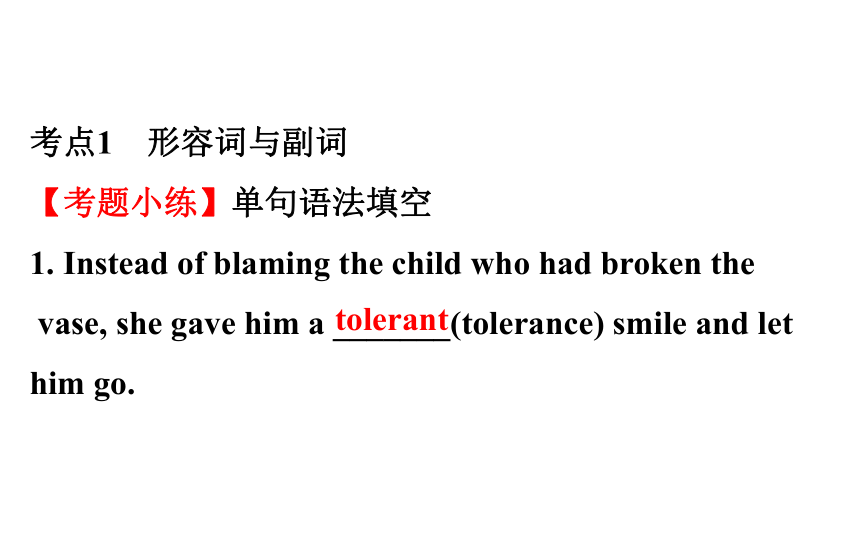

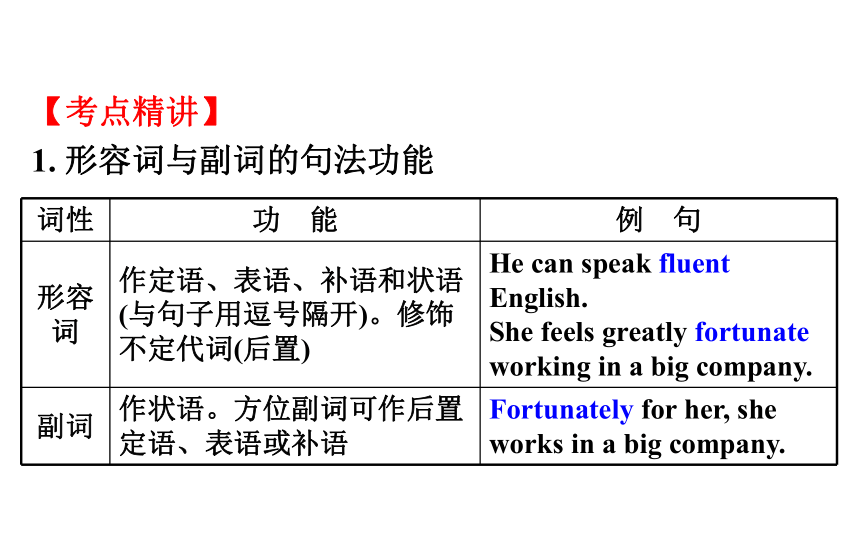
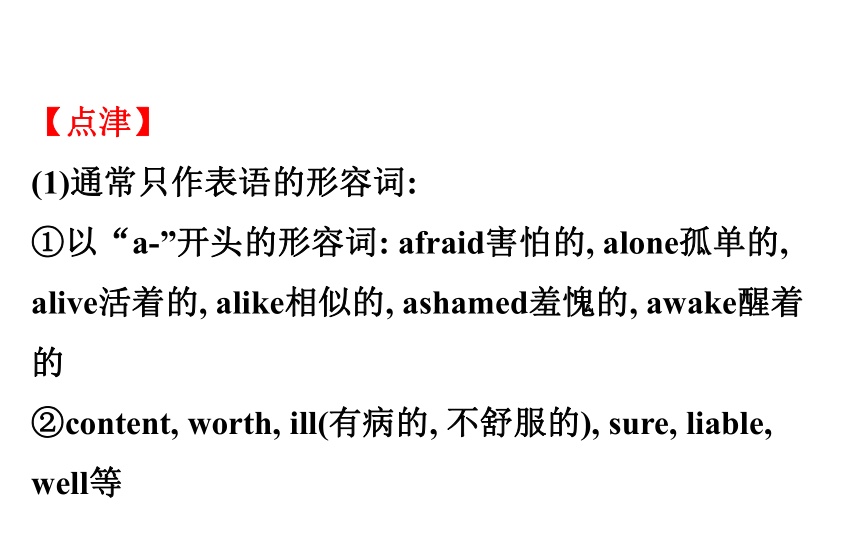
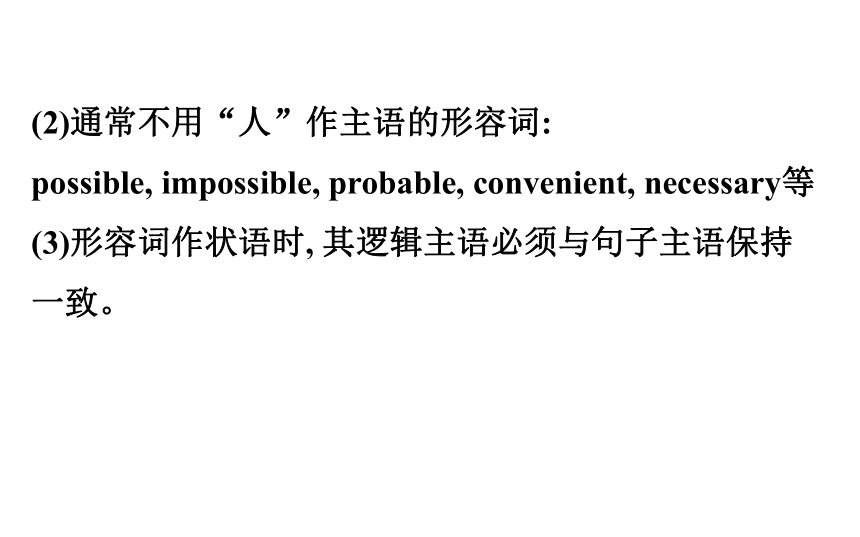
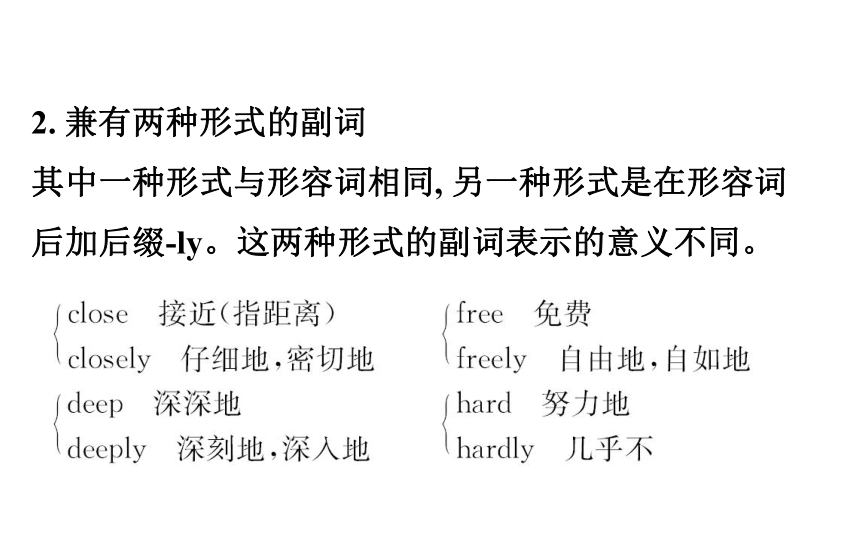
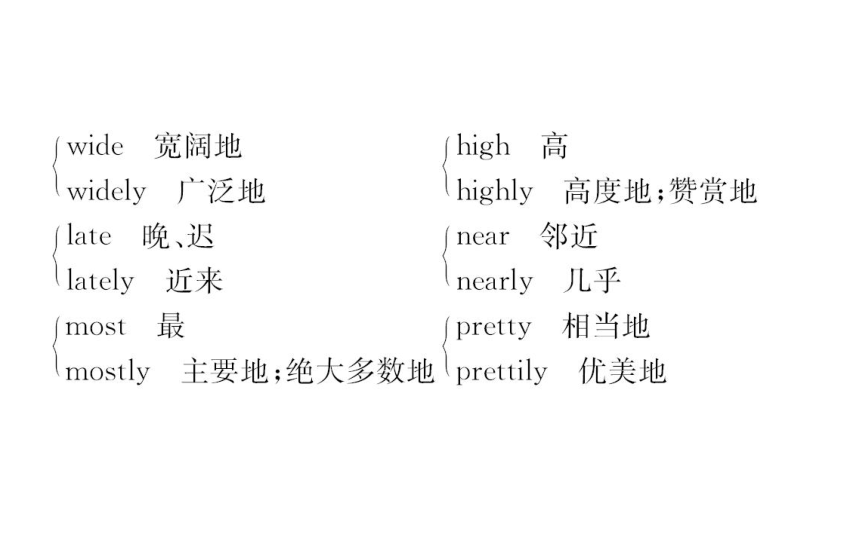
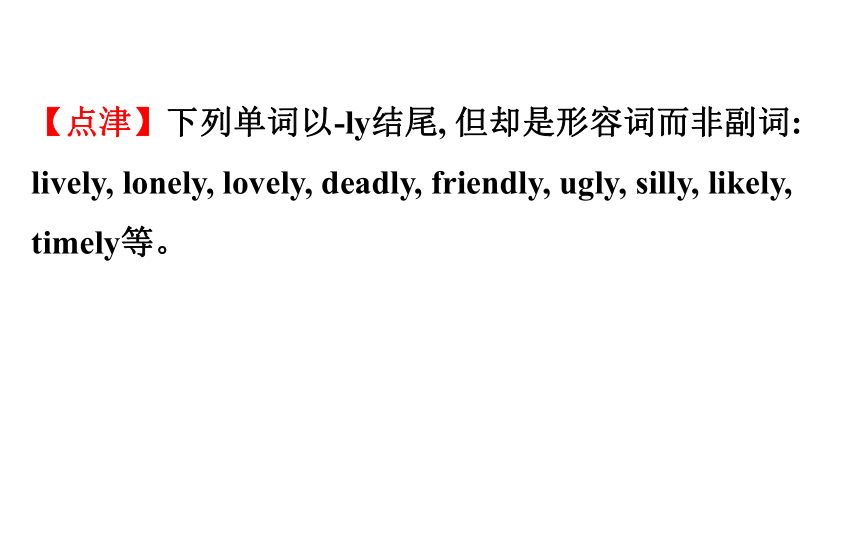
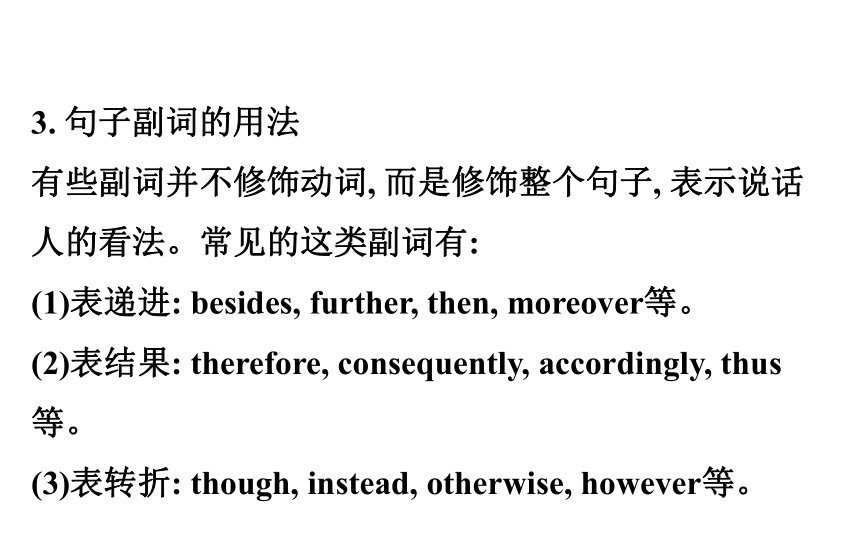
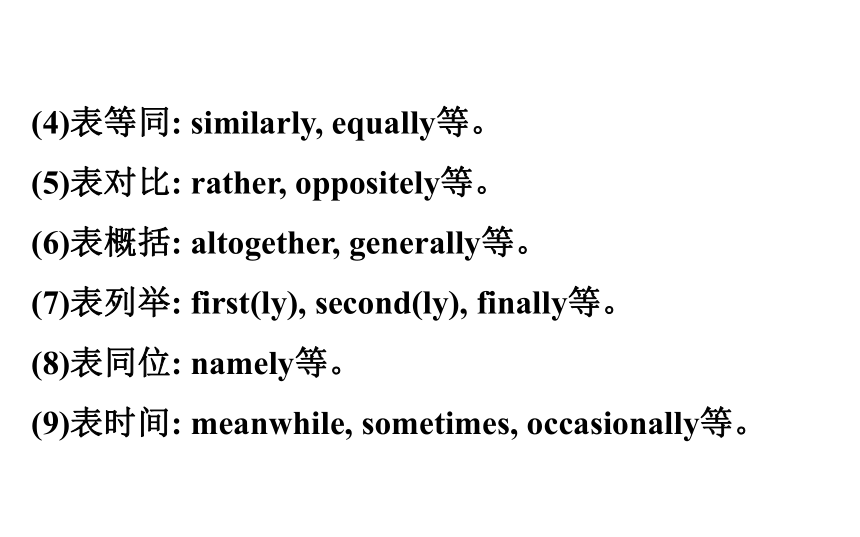
文档简介
第3讲
形容词、副词和比较等级
考点1 形容词与副词
【考题小练】单句语法填空
1. Instead of blaming the child who had broken the
vase, she gave him a _______(tolerance) smile and let
him go.
tolerant
2. A sudden stop can be a very frightening experience,
_________(especial) if you are traveling at high speed.
3. Water is very important to us, without which there
would be no life. ________, some people don’t turn off
the tap at once after using it.
4. _________(obvious), I was doing very badly.
especially
However
Obviously
【考点精讲】
1. 形容词与副词的句法功能
词性
功 能
例 句
形容词
作定语、表语、补语和状语(与句子用逗号隔开)。修饰不定代词(后置)
He can speak fluent English.
She feels greatly fortunate working in a big company.
副词
作状语。方位副词可作后置定语、表语或补语
Fortunately for her, she works in a big company.
【点津】
(1)通常只作表语的形容词:
①以“a-”开头的形容词: afraid害怕的, alone孤单的, alive活着的, alike相似的, ashamed羞愧的, awake醒着的
②content, worth, ill(有病的, 不舒服的), sure, liable, well等
(2)通常不用“人”作主语的形容词:
possible, impossible, probable, convenient, necessary等
(3)形容词作状语时, 其逻辑主语必须与句子主语保持一致。
2. 兼有两种形式的副词
其中一种形式与形容词相同, 另一种形式是在形容词后加后缀-ly。这两种形式的副词表示的意义不同。
【点津】下列单词以-ly结尾, 但却是形容词而非副词: lively, lonely, lovely, deadly, friendly, ugly, silly, likely, timely等。
3. 句子副词的用法
有些副词并不修饰动词, 而是修饰整个句子, 表示说话
人的看法。常见的这类副词有:
(1)表递进: besides, further, then, moreover等。
(2)表结果: therefore, consequently, accordingly, thus
等。
(3)表转折: though, instead, otherwise, however等。
(4)表等同: similarly, equally等。
(5)表对比: rather, oppositely等。
(6)表概括: altogether, generally等。
(7)表列举: first(ly), second(ly), finally等。
(8)表同位: namely等。
(9)表时间: meanwhile, sometimes, occasionally等。
(10)表特指: particularly, especially等。
*I don’t like it; besides, it’s too expensive.
*Playing on a frozen sports field sounds like a lot of fun. Isn’t it rather risky, though?
4. 七组容易混淆的词
beside在……旁边
besides此外, 而且
late迟的, 晚的
later多久以后, 后来 latest 最近的, 最新的
ago以前(以现在为起点)
before以前(以过去为起点)
somewhere某处
everywhere到处
sometime在某一时候
sometimes有时
near近的, 亲近的, 近似的
nearby附近的, 邻近的
good好的
well 很好地; 健康的
5. 常见的有关形容词、副词的固定搭配
very much alike 非常相像 much/so afraid 非常害怕
dead/blind drunk 酩酊大醉 low/high price 低价/高价
rain/snow heavily 雨/雪下得很大
breathe/drink/smoke heavily
喘粗气/酒喝得多/烟抽得多
heavy traffic/moustache 拥挤的交通/浓密的胡子
fast/sound asleep 酣睡
【题组训练】单句语法填空
1. This, together with his thin, twisted body and
awkward _____(face) expressions, can often cause
people to treat him as if he were a backward child.
facial
2. We will give 99% of our Facebook shares –________
(current) about $45 billion-to advance this valuable
mission.
3. ___________(surprising), he did not take my offer
but rather told me to pass the act of kindness forward
and help more people in need.
currently
Surprisingly
4. She believes this will help her understand the emotions
of the _______(origin) authors of the poems.
5. ________(global), in 2016 an additional 213 million
young people were overweight. Obesity researchers
say this is a huge problem that will get worse.
original
Globally
考点2 比较等级
【考题小练】单句语法填空
1. I think watching TV every evening is a waste of
time—there are _______________(meaningful) things
to do.
more meaningful
2. On our way home, the journey was much _____
(easy) than before as everyone else fell fast asleep. So,
I just took my time and enjoyed the drive.
3. This is by far the _____________(inspire) movie that
I have ever seen.
easier
most inspiring
4. At that time I knew it had to be a significant day to
them. Nothing could be ______(good) if someone
offered to help them.
better
【考点精讲】
1. 比较级和最高级的构成
(1)规则形式
①单音节以及少数双音节形容词和副词, 在原级后加-er, -est构成, 如hard—harder—hardest。其他特殊变化见下表:
特殊情况
构成方式
例词
以不发音的e结尾
加-r和-st
brave—braver—bravest
以“辅音字母+y”结尾
变y为i, 再加-er和-est
happy—happier—happiest
以重读闭音节结尾
双写词尾字母, 再加-er和-est
hot—hotter—hottest
②多音节和部分双音节形容词和副词, 在原级前加more, most构成。
active—more active—most active
happily—more happily—most happily
【点津】①少数双音节词及以-er或-le结尾的词, 可以有两种比较级和最高级形式
common—commoner/more common—commonest/most common
②表示“最高程度”的形容词, 如excellent, extreme, perfect, favorite等, 没有最高级, 也不能用比较级。
(2)不规则形式
good/well—better—best
far—farther/further—farthest/furthest
bad/ill/badly—worse—worst
2. 比较等级的用法
(1)基本用法
①两者相比, 表示“和……一样”, 用“as+原级+as”表示。
*He learns as quickly as his classmates.
【点津】在同级比较中, 若出现形容词修饰单数可数名词, 其语序为: as+ adj. +a(n)+n. +as。
*Our neighbor has as big a house as ours.
②两者相比, 表示“不如……”, 用“not as/so+原级+as”。
*Henry does not have as/so many books as I have.
③两者相比, 表示“比……更”, 用“比较级+than”; 表示“不比……更”, 用“not+比较级+than”。
*Seeking information on the Internet is more convenient than searching in a library.
【点津】有些形容词本身含有比较的意义, 其后面用to而不用than。如: superior to(优于, 高于); inferior to (次于); senior to (年长于, 地位高于); junior to(地位低于), prior to (早于, 较重要于)
④三个或三个以上的人或事物比较, 表示最高程度时, 用“the+最高级+比较范围”。
*During the 1990s, Michael Jordan was probably the best-known basketball player in the world.
(2)特殊用法
①“比较级+and+比较级”表示“越来越……”。
*Our school is becoming more and more beautiful.
②“the+比较级, the+比较级”表示“越……, 就越……”。
*The busier he is, the happier he feels.
③“more+原级+than”表示“与其说……不如说……”。
*She is more careless than stupid.
④“more than+主语+can+谓语”表示“非……所能; ……不能”。
*The beauty of the city is more than I can describe.
⑤“否定词+比较级”表示肯定的最高级
*Your story is perfect; I’ve never heard a better one before.
*I can’t agree more. 我非常同意。
⑥表示倍数的三个常用句型
a. . . 倍数+as+原级+as. . .
*He can run three times as fast as John.
b. . . 倍数+比较级+than. . .
*This table is three times bigger than that one.
c. . . 倍数+the size/length/width/height, etc. +of. . .
*Our classroom is three times as large as theirs.
=Our classroom is three times larger than theirs.
=Our classroom is three times the size of theirs.
3. 比较等级的修饰语
(1)修饰比较级的常用词和短语有rather, much, still,
even, far, a lot, a little, a great deal, (by) far, a bit等。
*The students study even harder than before.
(2)常用的最高级的修饰语有by far, nearly, almost, by
no means, not really以及序数词等。
*I’d like to buy the second most expensive camera.
【点津】by far通常用来修饰最高级, 但也可修饰比较级。修饰比较级时, 一般放在比较级后面, 若在前面, 应在两者之间加the。
*The book is better by far than that one.
*He is by far the taller of the two brothers.
【题组训练】单句语法填空
1. Too often we fail to recognize the difference between
the person and the performance. We forget that
forgiveness is _______(great) than revenge.
greater
2. The only thing _____(bad) than a snake you can see is
a snake you can’t see, however.
3. They responded, and seemed to play ______
(good)than before when the moments were critical.
worse
better
4. Polynesia and Micronesia have the _______(high)
rate of all—around half of the young population in
these countries is overweight or obese.
5. Martinez pulled over, got out of the bus, and
approached the boy. As she got a little _____(close),
she could see he was shaking from the cold.
highest
closer
【高考试水区】
1. (2018·11月浙江高考) ________(recent), caffeine has
found its way into orange, apple, and other flavored
drinks.
Recently
2. (2018·全国卷Ⅱ) A taste for meat is _______(actual)
behind the change: An important part of its corn is
used to feed chickens, pigs, and cattle.
3. (2018·全国卷Ⅰ)According to a review of evidence
in a medical journal, runners live three years ______
(long) than non-runners.
actually
longer
4. (2018·全国卷Ⅰ)Running is cheap, easy and it’s
always ________(energy).
5. (2018·全国卷Ⅲ) That makes her baby scream, and
then a 400-pound male appears. He screams the
_______(loud) of all.
6. (2018·6月浙江高考) There could be an even ______
(high) cost on your health.
energetic
loudest
higher
【微技能点拨】
1. 看到空格处修饰的是名词, 要想到用形容词。
2. 看到空格处修饰的是动词、形容词、副词或整个句子, 要想到用副词。
3. 看到与than连用, 要想到用形容词或副词的比较级。
4. 看到and, or, but等并列连词前或后用的比较级, 要想到用比较级。
5. 看到语境中暗含比较含义, 要想到用比较级(二者之间)或最高级(三者及以上)。
6. 熟记固定搭配或句型。
形容词、副词和比较等级
考点1 形容词与副词
【考题小练】单句语法填空
1. Instead of blaming the child who had broken the
vase, she gave him a _______(tolerance) smile and let
him go.
tolerant
2. A sudden stop can be a very frightening experience,
_________(especial) if you are traveling at high speed.
3. Water is very important to us, without which there
would be no life. ________, some people don’t turn off
the tap at once after using it.
4. _________(obvious), I was doing very badly.
especially
However
Obviously
【考点精讲】
1. 形容词与副词的句法功能
词性
功 能
例 句
形容词
作定语、表语、补语和状语(与句子用逗号隔开)。修饰不定代词(后置)
He can speak fluent English.
She feels greatly fortunate working in a big company.
副词
作状语。方位副词可作后置定语、表语或补语
Fortunately for her, she works in a big company.
【点津】
(1)通常只作表语的形容词:
①以“a-”开头的形容词: afraid害怕的, alone孤单的, alive活着的, alike相似的, ashamed羞愧的, awake醒着的
②content, worth, ill(有病的, 不舒服的), sure, liable, well等
(2)通常不用“人”作主语的形容词:
possible, impossible, probable, convenient, necessary等
(3)形容词作状语时, 其逻辑主语必须与句子主语保持一致。
2. 兼有两种形式的副词
其中一种形式与形容词相同, 另一种形式是在形容词后加后缀-ly。这两种形式的副词表示的意义不同。
【点津】下列单词以-ly结尾, 但却是形容词而非副词: lively, lonely, lovely, deadly, friendly, ugly, silly, likely, timely等。
3. 句子副词的用法
有些副词并不修饰动词, 而是修饰整个句子, 表示说话
人的看法。常见的这类副词有:
(1)表递进: besides, further, then, moreover等。
(2)表结果: therefore, consequently, accordingly, thus
等。
(3)表转折: though, instead, otherwise, however等。
(4)表等同: similarly, equally等。
(5)表对比: rather, oppositely等。
(6)表概括: altogether, generally等。
(7)表列举: first(ly), second(ly), finally等。
(8)表同位: namely等。
(9)表时间: meanwhile, sometimes, occasionally等。
(10)表特指: particularly, especially等。
*I don’t like it; besides, it’s too expensive.
*Playing on a frozen sports field sounds like a lot of fun. Isn’t it rather risky, though?
4. 七组容易混淆的词
beside在……旁边
besides此外, 而且
late迟的, 晚的
later多久以后, 后来 latest 最近的, 最新的
ago以前(以现在为起点)
before以前(以过去为起点)
somewhere某处
everywhere到处
sometime在某一时候
sometimes有时
near近的, 亲近的, 近似的
nearby附近的, 邻近的
good好的
well 很好地; 健康的
5. 常见的有关形容词、副词的固定搭配
very much alike 非常相像 much/so afraid 非常害怕
dead/blind drunk 酩酊大醉 low/high price 低价/高价
rain/snow heavily 雨/雪下得很大
breathe/drink/smoke heavily
喘粗气/酒喝得多/烟抽得多
heavy traffic/moustache 拥挤的交通/浓密的胡子
fast/sound asleep 酣睡
【题组训练】单句语法填空
1. This, together with his thin, twisted body and
awkward _____(face) expressions, can often cause
people to treat him as if he were a backward child.
facial
2. We will give 99% of our Facebook shares –________
(current) about $45 billion-to advance this valuable
mission.
3. ___________(surprising), he did not take my offer
but rather told me to pass the act of kindness forward
and help more people in need.
currently
Surprisingly
4. She believes this will help her understand the emotions
of the _______(origin) authors of the poems.
5. ________(global), in 2016 an additional 213 million
young people were overweight. Obesity researchers
say this is a huge problem that will get worse.
original
Globally
考点2 比较等级
【考题小练】单句语法填空
1. I think watching TV every evening is a waste of
time—there are _______________(meaningful) things
to do.
more meaningful
2. On our way home, the journey was much _____
(easy) than before as everyone else fell fast asleep. So,
I just took my time and enjoyed the drive.
3. This is by far the _____________(inspire) movie that
I have ever seen.
easier
most inspiring
4. At that time I knew it had to be a significant day to
them. Nothing could be ______(good) if someone
offered to help them.
better
【考点精讲】
1. 比较级和最高级的构成
(1)规则形式
①单音节以及少数双音节形容词和副词, 在原级后加-er, -est构成, 如hard—harder—hardest。其他特殊变化见下表:
特殊情况
构成方式
例词
以不发音的e结尾
加-r和-st
brave—braver—bravest
以“辅音字母+y”结尾
变y为i, 再加-er和-est
happy—happier—happiest
以重读闭音节结尾
双写词尾字母, 再加-er和-est
hot—hotter—hottest
②多音节和部分双音节形容词和副词, 在原级前加more, most构成。
active—more active—most active
happily—more happily—most happily
【点津】①少数双音节词及以-er或-le结尾的词, 可以有两种比较级和最高级形式
common—commoner/more common—commonest/most common
②表示“最高程度”的形容词, 如excellent, extreme, perfect, favorite等, 没有最高级, 也不能用比较级。
(2)不规则形式
good/well—better—best
far—farther/further—farthest/furthest
bad/ill/badly—worse—worst
2. 比较等级的用法
(1)基本用法
①两者相比, 表示“和……一样”, 用“as+原级+as”表示。
*He learns as quickly as his classmates.
【点津】在同级比较中, 若出现形容词修饰单数可数名词, 其语序为: as+ adj. +a(n)+n. +as。
*Our neighbor has as big a house as ours.
②两者相比, 表示“不如……”, 用“not as/so+原级+as”。
*Henry does not have as/so many books as I have.
③两者相比, 表示“比……更”, 用“比较级+than”; 表示“不比……更”, 用“not+比较级+than”。
*Seeking information on the Internet is more convenient than searching in a library.
【点津】有些形容词本身含有比较的意义, 其后面用to而不用than。如: superior to(优于, 高于); inferior to (次于); senior to (年长于, 地位高于); junior to(地位低于), prior to (早于, 较重要于)
④三个或三个以上的人或事物比较, 表示最高程度时, 用“the+最高级+比较范围”。
*During the 1990s, Michael Jordan was probably the best-known basketball player in the world.
(2)特殊用法
①“比较级+and+比较级”表示“越来越……”。
*Our school is becoming more and more beautiful.
②“the+比较级, the+比较级”表示“越……, 就越……”。
*The busier he is, the happier he feels.
③“more+原级+than”表示“与其说……不如说……”。
*She is more careless than stupid.
④“more than+主语+can+谓语”表示“非……所能; ……不能”。
*The beauty of the city is more than I can describe.
⑤“否定词+比较级”表示肯定的最高级
*Your story is perfect; I’ve never heard a better one before.
*I can’t agree more. 我非常同意。
⑥表示倍数的三个常用句型
a. . . 倍数+as+原级+as. . .
*He can run three times as fast as John.
b. . . 倍数+比较级+than. . .
*This table is three times bigger than that one.
c. . . 倍数+the size/length/width/height, etc. +of. . .
*Our classroom is three times as large as theirs.
=Our classroom is three times larger than theirs.
=Our classroom is three times the size of theirs.
3. 比较等级的修饰语
(1)修饰比较级的常用词和短语有rather, much, still,
even, far, a lot, a little, a great deal, (by) far, a bit等。
*The students study even harder than before.
(2)常用的最高级的修饰语有by far, nearly, almost, by
no means, not really以及序数词等。
*I’d like to buy the second most expensive camera.
【点津】by far通常用来修饰最高级, 但也可修饰比较级。修饰比较级时, 一般放在比较级后面, 若在前面, 应在两者之间加the。
*The book is better by far than that one.
*He is by far the taller of the two brothers.
【题组训练】单句语法填空
1. Too often we fail to recognize the difference between
the person and the performance. We forget that
forgiveness is _______(great) than revenge.
greater
2. The only thing _____(bad) than a snake you can see is
a snake you can’t see, however.
3. They responded, and seemed to play ______
(good)than before when the moments were critical.
worse
better
4. Polynesia and Micronesia have the _______(high)
rate of all—around half of the young population in
these countries is overweight or obese.
5. Martinez pulled over, got out of the bus, and
approached the boy. As she got a little _____(close),
she could see he was shaking from the cold.
highest
closer
【高考试水区】
1. (2018·11月浙江高考) ________(recent), caffeine has
found its way into orange, apple, and other flavored
drinks.
Recently
2. (2018·全国卷Ⅱ) A taste for meat is _______(actual)
behind the change: An important part of its corn is
used to feed chickens, pigs, and cattle.
3. (2018·全国卷Ⅰ)According to a review of evidence
in a medical journal, runners live three years ______
(long) than non-runners.
actually
longer
4. (2018·全国卷Ⅰ)Running is cheap, easy and it’s
always ________(energy).
5. (2018·全国卷Ⅲ) That makes her baby scream, and
then a 400-pound male appears. He screams the
_______(loud) of all.
6. (2018·6月浙江高考) There could be an even ______
(high) cost on your health.
energetic
loudest
higher
【微技能点拨】
1. 看到空格处修饰的是名词, 要想到用形容词。
2. 看到空格处修饰的是动词、形容词、副词或整个句子, 要想到用副词。
3. 看到与than连用, 要想到用形容词或副词的比较级。
4. 看到and, or, but等并列连词前或后用的比较级, 要想到用比较级。
5. 看到语境中暗含比较含义, 要想到用比较级(二者之间)或最高级(三者及以上)。
6. 熟记固定搭配或句型。
